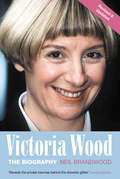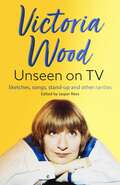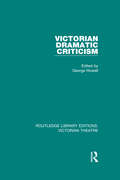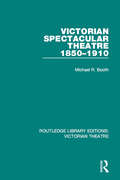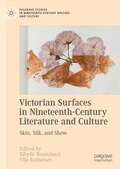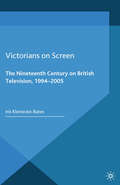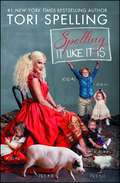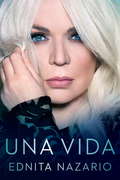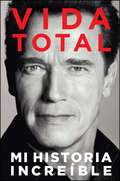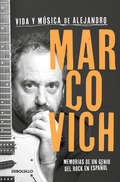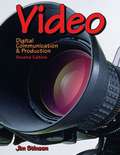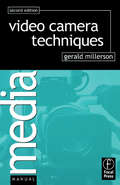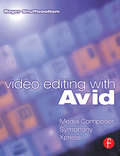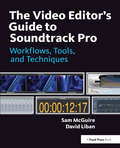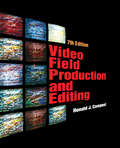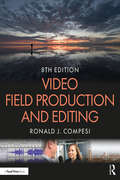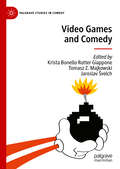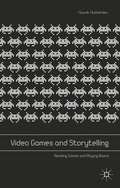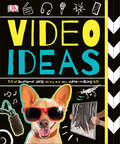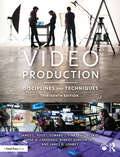- Table View
- List View
Victoria Wood: The Biography
by Neil Brandwood'One of the great British comedians and all-round entertainers of her generation' Guardian'Bittersweet but scalpel sharp' Radio Times'One of Britain’s finest ever performers ... a sublime and unparalleled crafter of words' Independent Victoria Wood's wit and humour endeared her to millions of TV viewers for over four decades. Writer, producer and actress of television shows such as As Seen on TV and Dinnerladies, Victoria was often voted the funniest woman in Britain. Her rise to stardom, from her early years in Lancashire to the successes of the sell-out shows at the Royal Albert Hall, is sympathetically and honestly portrayed by Neil Brandwood. This meticulously researched and written biography provides an insightful account of the life and career of one of Britain's best-loved comediennes.
Victoria Wood Unseen on TV: Unseen On Tv
by Jasper Rees Victoria Wood'There was none like her before and there's been none like her since' Dawn FrenchIn the five years since Victoria Wood's death, one great sadness has been the realisation that we will never again be surprised by new material from her.But as part of the research for Let's Do It, the critically acclaimed Sunday Times bestseller, her official biographer Jasper Rees uncovered a treasure chest of unseen work. From her first piece of comic prose, for the school magazine, through to material written for the great TV shows of her maturity, this joyful hoard of unreleased material spans nearly half a century.Victoria Wood: Unseen on TV is a unique and intimate insight into the working of an irreplaceable genius of comedy.From the first to the last, here are sketches, songs and stand-up monologues that no one else could have written, which will make you laugh in the way that only she could.'He was a lovely man he had a lovely gap between his two front teeth. I specially noticed it cos he had a mushy pea stuck in it. He said can I take you home I said hang on I haven't finished my Tizer. So, we get home he says can I come in for a coffee. I said I haven't got any coffee but you can come in for a Horlicks if you don't mind sucking your own lumps.'Praise for Let's Do It:'Rees pulls off the trick of writing a brilliant tribute while also - somehow, almost - bringing Victoria Wood back to life in all her complicated glory.' Guardian'An immersive, authoritative book' Spectator'Impeccable' Daily Telegraph'A must-read' Daily Mirror'A joy' Daily Mail
Victorian Dramatic Criticism (Routledge Library Editions: Victorian Theatre #5)
by George RowellOriginally published in 1971. The Victorian Age was one of popular theatre and increasingly popular journalism. One manifestation of this journalism was the emergence of the dramatic critic from the anonymity and brevity which had previously characterized periodical treatment of the theatre. If Victorian theatre is regarded as existing essentially thirty years before Victoria acceded and continuing until the outbreak of war in 1914, the names of Lamb, Leigh Hunt and Hazlitt at one end, and of Beerbohm and MacCarthy at the other, can be added to a list that includes Lewes, James, Archer, Walkley, Shaw and Montague. All these writers, and others less famous, are represented in this selection. By selecting the articles on the basis of the play in performance, rather than the play as literature, and by arranging them according to various aspects of the theatrical process, this book builds up a skilful and lively picture of the contemporary theatre at work, in the words of its leading commentators. The anthology successfully conveys the qualities of abundance and vitality to characteristic of Victorian theatre.
Victorian Spectacular Theatre 1850-1910 (Routledge Library Editions: Victorian Theatre #3)
by Michael R. BoothOriginally published in 1981. This study concentrates on one aspect of Victorian theatre production in the second half of the nineteenth century – the spectacular, which came to dominate certain kinds of production during that period. A remarkably consistent style, it was used for a variety of dramatic forms, although surrounded by critical controversy. The book considers the theories and practice of spectacle production as well as the cultural and artistic movements that created the favourable conditions in which spectacle could dominate such large areas of theatre for so many years. It also discusses the growth of spectacle and the taste of the public for it, examining the influence of painting, archaeology, history, and the trend towards realism in stage production. An explanation of the working of spectacle in Shakespeare, pantomime and melodrama is followed by detailed reconstructions of the spectacle productions of Irving’s Faust and Beerbohm Tree’s King Henry VIII.
Victorian Surfaces in Nineteenth-Century Literature and Culture: Skin, Silk, and Show (Palgrave Studies in Nineteenth-Century Writing and Culture)
by Sibylle Baumbach Ulla RatheiserThis volume explores the politics and poetics of Victorian surfaces in their manifold manifestations. In so doing, it examines various cultural products ‘as they are’ and highlights the art of surface composition in the Victorian era as well as the socio-cultural ramifications of the preoccupation with the exterior. By closely reading the various surfaces materialising in Victorian literature and culture, the individual contributions explore the dialectics of surface and depth in Victorian (and Neo-Victorian) cultures as well as the legibility of surfaces. They look into the surfaces of literary narratives, paintings, and film but also into natural surfaces such as skin or bark. Each chapter foregrounds what is present rather than absent in a text, while also paying attention to the surfaces that become manifest on the diegetic level of the text, be they cloth, landscapes, or human bodies or faces.This is an open access book.
Victorians on Screen: The Nineteenth Century on British Television, 1994-2005
by Iris Kleinecke-BatesVictorians on Screen investigates the representation of the Victorian age on British television from the mid-1990s to the mid-2000s. Structured around key areas of enquiry specific to British television, it avoids a narrow focus on genre by instead taking a thematic approach and exploring notions of authenticity, realism and identity.
vicTORIous
by Tori SpellingTHE REALITY BEHIND REALITY TV! HOLLYWOOD'S FAVORITE MOM-STAR TELLS IT LIKE IT IS! Tori Spelling is the first to admit that the "reality" behind her popular television show, Tori & Dean, isn't always real. Not even Star magazine could invent the true chaos that happens behind the scenes. Luckily, Tori is famously honest and self-deprecatingly funny when it comes to her personal life. She's always Spelling It Like It Is... Life is never boring at Tori's house, but since the release of her New York Times bestselling memoirs sTORI Telling, Mommywood, and Un-charted terriTORI, things have been especially unpredictable: finding out she was pregnant with her third baby after nearly vomiting live on the Home Shopping Network; trying to hide her fourth pregnancy so soon after giving birth (as her stylist said, "Who would be that crazy?"); being rescued from a paparazzo by a mom lynch mob; stalking her celebrity neighbor; and allowing cameras to film every personal detail of her life--from the most challenging time in her marriage to the only time in six years when she really felt as though those cameras invaded her privacy. Tori shares these stories and many more with the usual humor, candor, and down-to-earth charm that her fans love. She also writes openly about her biggest challenges: the terrifying health problems surrounding her high-risk pregnancy with her youngest son, Finn; her guilt over missing baby Hattie's early months because she was in the hospital on bed rest; her struggles (and failures) to live within her means after growing up in opulence; the discovery that she has a lot in common with her late mega-producer father, Aaron Spelling; and how she fell in love with Dean all over again (hint: it didn't happen at their vow renewal ceremony). After years of revealing her everyday antics on-screen, Tori's life is still full of surprises. Slowing down long enough to enjoy them? Now that's another sTORI.
Una Vida
by Ednita Nazario“Ednita siempre ha sido la “gran dama” que nos señaló el camino, con un espíritu de innovación, tenacidad y entendiendo lo que es la música actual”. —Ricky Martin Pocos cantantes han sido capaces de generar el interés internacional y multigeneracional del que ha disfrutado la artista Ednita Nazario. Una de las estrellas del pop latino más admiradas y con más grabaciones que han resultado en hits, es reconocida por su riqueza vocal y su magnética presencia en los escenarios. En estas páginas Ednita, la diva más amada de Puerto Rico, por primera vez abre su corazón narrando su vida entera, con detalles nunca antes revelados al público. Desde sus humildes comienzos en Ponce, pasando por la pérdida de su gran amor, la bancarrota emocional y financiera y finalmente el regreso al estrellato. Ednita nos abre su corazón y su historia con absoluta sinceridad y transparencia, desde los momentos más felices de su vida hasta los más desgarradores. Una historia de inspiración, amor, familia: esta es Ednita Nazario con toda la pasión y el talento que la han convertido en una de las estrellas más celebradas de nuestra era.
Vida Total: Mi Historia Increíble
by Arnold SchwarzeneggerLA MEJOR HISTORIA DE INMIGRACIÓN DE NUESTROS TIEMPOSSu historia es única, divertida, y en estas páginas la cuenta de manera brillante. Nació durante un año de hambruna en un pequeño pueblo de Austria, hijo de un jefe de policía muy austero. Soñaba con mudarse a los Estados Unidos para convertirse en campeón del fisiculturismo y estrella de cine. A los veintiún años vivía en Los Ángeles y ya había sido coronado como Mr. Universo. Cinco años más tarde había aprendido a hablar inglés y se había convertido en el mejor fisiculturista del mundo. Diez años más tarde había completado su título universitario y se había vuelto millonario gracias a sus empresas comerciales en el sector inmobiliario, el paisajismo y el fisiculturismo. También había ganado un Golden Globe por su debut como actor dramático en Stay Hungry. Veinte años más tarde era la estrella de cine más famosa del mundo, estaba casado con Maria Shriver y era un líder republicano emergente que formaba parte de la familia Kennedy. Treinta y seis años después de haber llegado a los Estados Unidos, el hombre que alguna vez fue conocido entre sus compañeros fisiculturistas como el "roble austriaco" fue elegido como gobernador de California, la séptima economía más grande del mundo. Gobernó el estado a lo largo de una crisis presupuestaria, desastres naturales y disturbios políticos, trabajando con ambos lados del espectro político para crear un mejor ambiente, reformas electorales y soluciones bipartidistas. Con Maria Shriver crió a cuatro hijos fantásticos. En medio del escándalo que él mismo creó, intentó mantener a su familia unida. Hasta ahora nunca ha contado la historia completa de su vida, en su propia voz. Éste es Arnold. Ésta es su vida total.
Vida y música de Alejandro Marcovich: Memorias de un genio del rock en español
by Alejandro Marcovich"Un libro valiente y apasionado, de una sinceridad kamikaze. Marcovich se somete a una operación de cráneo abierto y escribe del mismo modo: sus ideas surgen de sus heridas. Cada página es un solo de guitarra eléctrica" Juan Villoro En estas memorias, Alejandro Marcovich nos muestra el largo andar que lo ha llevado desde su niñez en Buenos Aires, el mágico encuentro con la guitarra como forma de expresión ante un mundo frío y muchas veces desolador, su traslado a México, los años de juventud y exploración creativa, su carrera meteórica en la ya legendaria banda Caifanes y más... hasta ser el reconocido artista y productor de música que hoy en día es. En estas páginas la leyenda se desnuda y se muestra sin velos: un individuo que pasó largas horas de estudio y práctica guiado por una corazonada, que luchó y franqueó agonías para cumplir el sueño de la creación musical. Edición corregida y revisada por el autor.
Video: Digital Communication & Production
by Jim StinsonComprehensive textbook designed as a complete introductory course in video-the 21st centruy hybrid of television and film techniques that is the future of all media production.
Video: Digital Communication and Production (3rd Edition)
by Jim StinsonThe comprehensive textbook has been updated to include the most up-to-date digital equipment and processes prevalent in the video industry and addresses all major video production topics, including an overview of the video production process, video composition, program development, the operation of video camera systems, lighting equipment and techniques, audio equipment and recording, directing, editing principles, and digital software basics.
Video Basics
by Herbert ZettlReflecting the latest from real-world practice, VIDEO BASICS, 8th Edition, by Emmy award-winning producer, director, and innovator Herbert Zettl delivers the most authoritative, current, and technically accurate guide to video production available. Concise yet thorough, the text moves you quickly from video concepts and processes to production tools and techniques, and -- ultimately -- the production environment (studio and field, indoors and out) and its effects. A more conceptual framework helps you progress from the idea (what to create) to the image (how to create) on video. In addition, the accompanying MindTap digital experience helps you ensure your course success with a range of interactive study tools.
Video Basics
by Herbert ZettlHerbert Zettl draws on his expertise and field experience to bring you the sixth edition of VIDEO BASICS, the handiest and most authoritative, current, and technically accurate student guide to video production available. Meeting the need for a briefer book, this text distills comprehensive video instruction so that it can be covered in a single semester. The book moves students from video concepts and processes to production tools and techniques and, finally, to the production environment (studio and field, inside and outside) and its effects. A more conceptual framework leads students from the idea (what to create) to the image (how to create) on video. Contrary to the previous editions of VIDEO BASICS, which reflected the transition from analog to digital technology, VIDEO BASICS, 6th Edition, acknowledges that digital video is a firmly established medium. References to analog are made only to help explain the digital process or the analog equipment that is still in use.
Video Basics 7
by Herbert ZettlHerbert Zettl draws on his expertise and field experience to bring you the seventh edition of VIDEO BASICS, the handiest and most authoritative, current, and technically accurate student guide to video production available. Meeting the need for a briefer book, this text distills comprehensive video instruction so that it can be covered in a single semester. The book moves students from video concepts and processes to production tools and techniques and, finally, to the production environment (studio and field, inside and outside) and its effects. A more conceptual framework leads students from the idea (what to create) to the image (how to create) on video.
Video Camera Techniques: A New Media Manual (Media Manuals Ser.)
by Gerald MillersonVideo Camera Techniques is an ideal starter guide for anyone owning a camcorder, newcomers to the field of broadcast or corporate video-making, or students who all wish to make videos to professional standards. Written in Gerald Millserson's easy to understand style, this step by step guide will help you to master the operation of your camera and quickly develop your own style and imaginative skills.This new edition now covers the latest types of video camera and gives guidance on camera handling and picture making form basics to advanced techniques.Gerald Millerson's books on video and television have long been acknowledged as among the best ever published. For more in-depth coverage of all aspects of video production his highly acclaimed Video Production Handbook is the definitive work on the subject. He is the author of two other titles in the Media Manuals series - Lighting for Video and Effective TV Production. His other books published by Focal Press are The Technique of TV Production (now in its 12th edition), The Techniques of Lighting for TV and Film and TV Scenic Design Handbook.
Video Communication & Production
by Jim StinsonComprehensive textbook designed as a complete introductory course in video-the 21st century hybrid of television and film techniques that is the future of all media production.
Video Editing with Avid: Media Composer, Symphony, Xpress
by Roger ShufflebottomThis is the first comprehensive guide to editing on Avid from a PAL standpoint, also including NTSC information where appropriate, making this book a worldwide manual.If you are already using Media Composer, Symphony, or Xpress and want to improve and consolidate your basic methods, or if you need to learn these systems from scratch, then this book is for you. This invaluable reference source explains, from beginner to intermediate level, the similarities and differences of these three packages and will ensure you get the most out of your Avid system. Based on his experience as a film and video editor and trainer, Roger Shufflebottom imparts all the information you need in a clear, accurate and easy to follow format. He provides a comprehensive guide to all the main editing tools of Media Composer, Symphony and Xpress. The text covers Media Composer versions 7-10, Xpress versions 2-4, and Symphony versions 1-3. Extra information is also included on Media Composer version 10.5, Symphony version 3.5 and Xpress version 4.5. Specific Apple Mac and Windows NT information is included.Moving beyond basic editing, 2D effects, 3D effects and graphic import are explained in detail. By working through the text you will be able to complete an Avid project competently and intuitively and you will learn some efficient and powerful working techniques.Roger Shufflebottom has been an editor since 1974, began training in 1993 and has run courses for major broadcasters including the BBC, Carlton, BskyB, Pearson Television and the American Forces Network as well as many facility companies. He is an Avid Certified Instructor and has written many articles for 'Avid User' magazine.
The Video Editor's Guide to Soundtrack Pro: Workflows, Tools, and Techniques
by Paul Lee Sam McGuireThis book tells you how, why, and when you should perform certain audio postproduction tasks within Soundtrack Pro 3 while editing your video in the Final Cut Studio suite. Intertwining video editing workflows with audio editing workflows for video editors using Final Cut Studio 3, it also describes in-depth the audio postproduction process as well as the specific tools used for editing and mixing audio within Soundtrack Pro 3. The final section is designed as an audio postproduction "cook-book", describing typical audio post scenarios with detailed workflows for dealing with them.The book provides real-world workflows and step-by-step instruction on the basics of audio editing in STP3, implementing sound effects, spectral tools and much more. Also included is a DVD containing both video and audio files, demonstrating surround sound, mixing procedures, and other audio editing processes. Included as well are project files with which you can refine techniques learned in the book. The DVD is not included with the E-book. Please contact the publisher for access to the DVD content by emailing d.mcgonagle@elsevier.com.
Video Field Production and Editing
by Ronald CompesiVideo Field Production and Editing concentrates on video techniques and technology appropriate for "small scale" single-camera electronic field production (EFP) and electronic news gathering (ENG). This book offers the latest material on new digital field recording and editing technologies and is written in a concise, non-technical, user-friendly format. Reorganized and updated throughout, with new sections dedicated to HDV (High Definition Video) videotape recording formats, and tapeless digital recording media including high capacity optical discs, solid-state memory cards, and computer hard drives, the book walks the reader through the video production process from initial planning through final editing.
Video Field Production and Editing
by Ronald J. CompesiIn the eighth, revised edition of this book, Ronald J. Compesi offers a comprehensive and in-depth introduction to the aesthetics of small-scale, single-camera video production in field environments, from planning through postproduction, in a range of different programming formats. Written in an accessible, student-friendly style, this new edition has been significantly updated and revised throughout to reflect current technology and industry practices, including shooting with DSLR cameras, in HD and on smartphones, new methods and channels of distribution, and much more. Key features and updates to the eighth edition include: A focus on small-scale video production, involving a minimum amount of field equipment and a small crew, offering creative solutions for video producers with limited resources and personnel; Discussions of HD and 4K technology/acquisition, LED lighting, shooting with DSLR cameras and smartphones, new online distribution channels; Over 300 photos and line art, in full-color for the first time, illustrating production processes, technical issues and equipment, and illuminating key aesthetic elements; An eResource with downloadable production planning documents, links to further online resources, production project exercises, and sample test questions. With over 40 years of teaching and production experience, Ronald J. Compesi offers an up-to-date and essential introduction to the art of small-scale video production in field environments in the new edition of this groundbreaking text, in print since 1985.
Video Games and Comedy (Palgrave Studies in Comedy)
by Krista Bonello Rutter Giappone Tomasz Z. Majkowski Jaroslav ŠvelchVideo Games and Comedy is the first edited volume to explore the intersections between comedy and video games. This pioneering book collects chapters from a diverse group of scholars, covering a wide range of approaches and examining the relationship between video games, humour, and comedy from many different angles. The first section of the book includes chapters that engage with theories of comedy and humour, adapting them to the specifics of the video game medium. The second section explores humour in the contexts, cultures, and communities that give rise to and spring up around video games, focusing on phenomena such as in-jokes, player self-reflexivity, and player/fan creativity. The third section offers case studies of individual games or game series, exploring the use of irony as well as sexual and racial humour in video games.
Video Games and Storytelling
by Souvik MukherjeeGrand Theft Auto IV saw more copies being sold than the latest superhero blockbusters or the last Harry Potter novel. Most of its players and critics commend its storytelling experience; however, when it comes to academic analysis, mainstream humanities research seems confused about what to do with such a phenomena. The problem is one of classification, in the first instance: 'is it a story, is it a game, or is it a machine?' Consequently, it also becomes a problem of methodology – which traditional discipline, if any, should lay claim to video game studies becoming the moot question. After weathering many controversies with regards to their cultural status, video games are now widely accepted as a new textual form that requires its own media-specific analysis. Despite the rapid rise in research and academic recognition, video game studies has seldom attempted to connect with older media and to locate itself within broader substantive discourses of the earlier and more established disciplines, especially those in the humanities. Video Games and Storytelling aims to readdress this gap and to bring video games to mainstream humanities research and teaching. In the process, it is also a rethinking story versus game debate as well as other key issues in game studies such as time, agency, involvement and textuality in video game-narratives.
Video Ideas
by DKImagine and create awesome videos and animations to share with friends and family, and on YouTube, using phones, webcams, cameras, or camcorders.Inspirational and fun, this engaging book explores the video-making process from script to screen, with techniques to try out and practical tips to produce exciting projects at home. Discover how to get the best angles, lighting, and sound quality, and add special effects when recording using phone, webcam, camera, or camcorder. Turn footage into a finished product by adding visual effects with editing software, and find out how to format, upload, and create a trailer for the masterpiece. Whether you want to record special occasions, zany pets, action-packed sports events, a music video, or a stop-motion animation, Video Ideas has everything you need!The book's content supports the STEAM (Science, Technology, Engineering, Art, Math) approach to cross-curricular learning.
Video Production: Disciplines and Techniques
by James C. Foust Edward J. Fink Phil Beskid Jose A. Cardenas Robert Gordon Jr. James B. LohreyThis seminal text, now in its thirteenth edition, provides a comprehensive and accessible overview of the operations underlying video production.It provides thorough coverage of the theory and techniques readers need to know, balancing complexity with practical how-to information about detailed subjects in a concise, conversational style. The book has been updated to incorporate recent changes in the video production pipeline–emphasizing digital video, non-linear video production, streaming platforms, mobile production, and do-it-yourself video–while maintaining the foundational, nuanced, teamwork-based approach that has made the book popular.Chapters include key takeaways, review questions, on-set exercises, and QR codes, and a comprehensive glossary defines all the key production terms discussed. An accompanying eResource includes downloadable versions of the forms and paperwork used in the book, in addition to links to further online resources.
